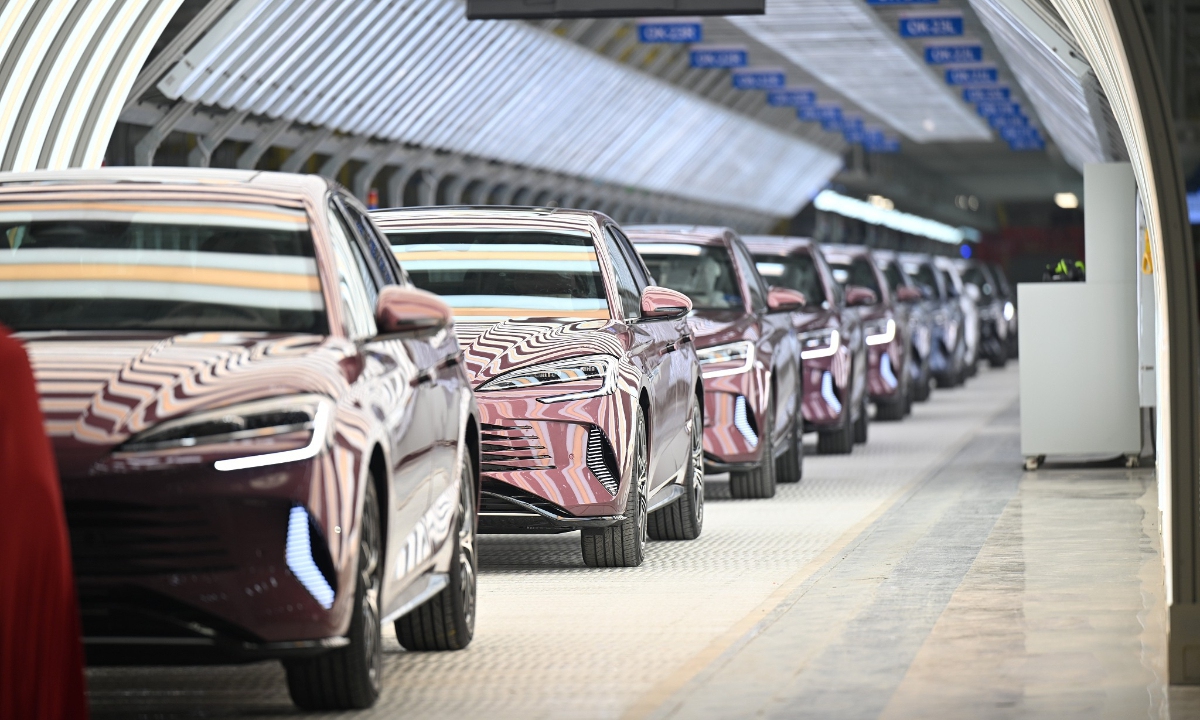
EV Photo:VCG
China's decision to launch a countervailing investigation into certain dairy products from the EU was based on applications from the domestic industry, which is fundamentally different from the European Commission (EC)'s hasty initiation of an anti-subsidy investigation into Chinese electric vehicles (EVs) without applications from member states or industry sectors, Chinese Ministry of Commerce (MOFCOM) spokesperson He Yadong said at a regular press conference on Thursday.
The remarks were made in response to a question about the
probe of certain EU dairy products, which was announced by the MOFCOM on Wednesday, with immediate effect, after reviewing applications from domestic industry groups among other legal procedures.
The ministry's move drew the attention of some Western media outlets, as it came after the EC disclosed on Tuesday draft definitive findings of its so-called anti-subsidy investigation into Chinese EVs. Certain media organizations speculated that the probe into certain dairy products was a so-called retaliatory measure in response to the
EC's decision to lower but not completely eliminate tariffs on Chinese EVs on Tuesday.
Both the MOFCOM and Chinese experts said that the investigation into certain EU dairy products was based on WTO rules, in stark contrast with the unilateral move by the EU on Chinese EVs.
According to Chinese laws and WTO rules, domestic industries have the right to apply for trade remedies to maintain fair market competition and their legitimate rights, He said.
After receiving the applications, the MOFCOM followed legal procedures and conducted pre-investigation consultations with the European side, examining the submitted materials and relevant evidence.
The ministry found that the application met the conditions for initiating an anti-subsidy investigation and decided to proceed with it, the spokesperson said.
"I want to emphasize that the investigation has just begun. We will conduct it transparently and in accordance with Chinese laws and WTO rules, fully safeguarding the rights of all stakeholders," He further noted.
"The primary aim of the Chinese investigation into certain EU dairy products is to maintain market order and protect the interests of relevant domestic enterprises as a way to shield our market from unfair commercial competition and interference," Cui Hongjian, a professor at Beijing Foreign Studies University's Academy of Regional and Global Governance, told the Global Times on Thursday.
Cui said that China's countervailing probe was not a spur-of-the-moment decision but had been in the works for some time according to procedures.
The
Global Times learned exclusively in June from a business insider that relevant Chinese industries were preparing evidence, as they planned to apply to competent authorities to launch an anti-subsidy investigation into imports of relevant dairy products from the EU.
On July 29, the MOFCOM received a formal application from the Dairy Association of China and the China Dairy Industry Association on behalf of the domestic dairy industry to launch a countervailing probe.
On August 7, the MOFCOM issued, in accordance with corresponding laws and regulations, an invitation for consultations to the EU on relevant countervailing investigation matters, and it held consultations with the EU on August 14.
"Given this context, China demonstrates adherence to multilateral trade rules and handles trade friction in a reasonable and compliant manner, which contrasts with the EU's unilateral investigation into Chinese EVs," Cui said.
In stark contrast with China's move, the EU has launched probes into Chinese EVs unilaterally, despite strong opposition from industry groups on both sides.
Since the beginning of this year, the
EU has launched five major investigations into Chinese companies under the Foreign Subsidies Regulation -- a regulation known for its role in primarily deterring foreign companies.
The EU's tariff decision involving imports of Chinese EVs has drawn
wide criticism and concerns even within the bloc, with officials and leading industry groups -- including those from Germany -- constantly expressing their opposition to the move for its disruption to trade and cooperation.
Despite all these developments, in a press release on Tuesday, the EC reaffirmed overall the bloc's previous findings, in its draft definitive findings involving the anti-subsidy probe, that Chinese EV production had benefited from extensive subsidies and proposed final duties of up to 36.3 percent, compared with the previous maximum provisional tariff of 37.6 percent, Reuters reported.
Experts said that the EU deviated from WTO rules in dealing with Chinese new-energy products.
"The EU's approach not only failed to follow the normal procedures for handling trade disputes among member states but also actively intervened in the market, reflecting its protectionist stance and disrupting normal market activities," Cui said.




